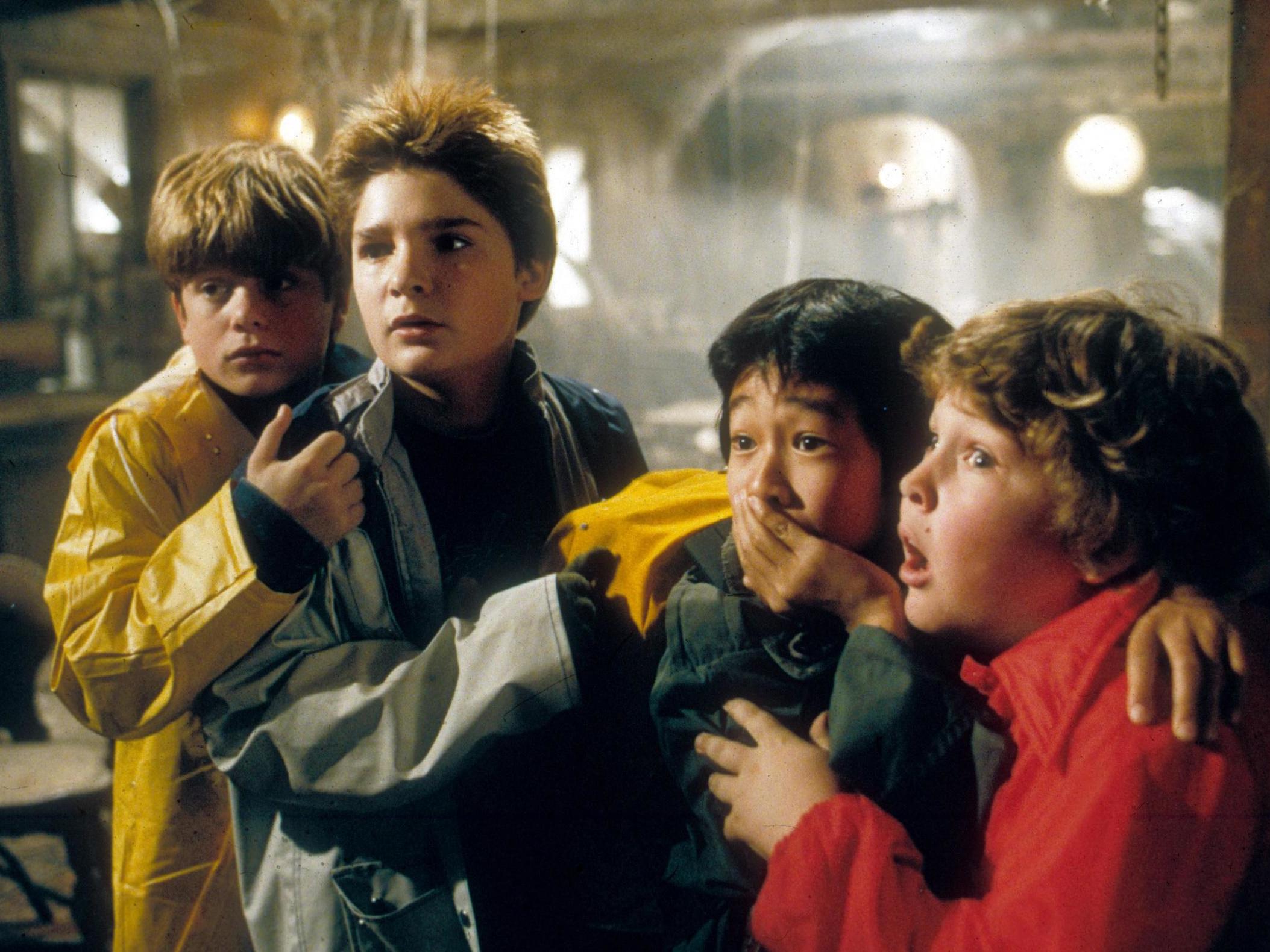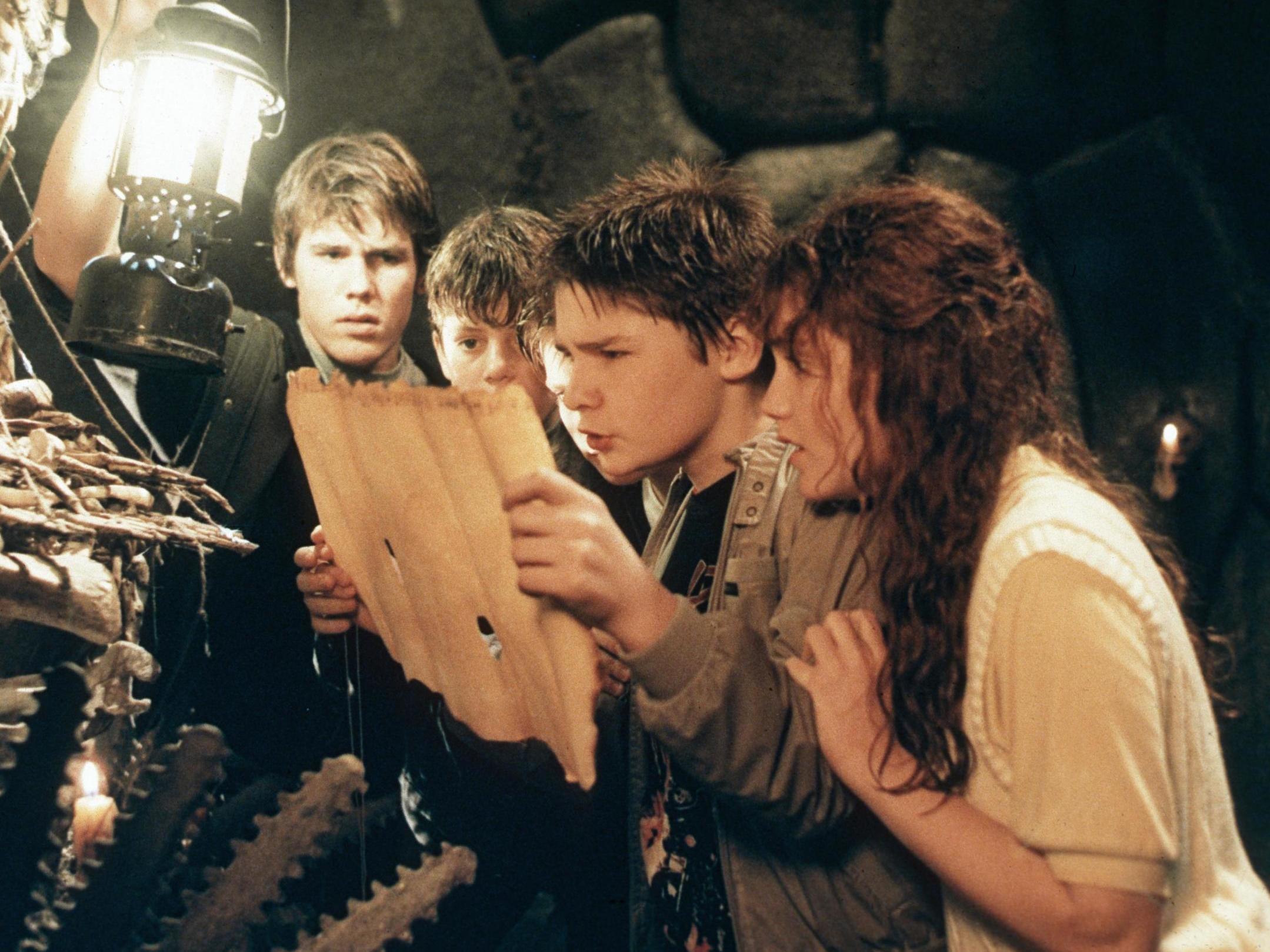The Goonies: Inside the 1980s treasure hunt adventure whose cult appeal will never die
As the Steven Spielberg-produced adventure is re-released in cinemas, Al Horner explains why the film couldn't be released in 2019 – but remains an enduring classic

Imagine pitching a movie like The Goonies. “Hi there,” you smile as you stroll into a room of Hollywood studio execs. “I’d like to make a film that’s part pirate caper, part Indiana Jones treasure hunt, part monster horror, part mob thriller and part coming-of-age drama.” What’s it about, they might ask. “Wait for it… A real estate deal in a small, unglamorous American town!” you reply enthusiastically, at which point security arrive to drag you off the premises for wasting their time. After all, you’d have to be Superman to weave a coherent story out of so many outlandish ideas heaped on top of each other, let alone turn it into a box-office smash, beloved by children and adults for generations to come.
The Goonies didn’t have Superman. The 1985 kids favourite, back in cinemas for one week only from this Friday, had the next best thing: director Richard Donner, who a few years earlier had basically birthed modern superhero cinema with two blockbusters about the Man of Steel (1978’s Superman and 1980’s Superman II). Also fighting the movie’s corner was another filmmaker of superhuman Hollywood heft – Steven Spielberg. Legend has it that Spielberg was working on The Color Purple when the thought struck him: what do children do on rainy days? What adventures might they dream up?
He handed this germ of an idea to Donner and screenwriter Christopher Columbus, who expanded it into a story about a gang of misfits facing a future apart. A deal had been struck to demolish their neighbourhood, the Goon Docks, to make way for an expanding golf resort. That is, unless residents Mikey, Mouth, Data, Chunk and Brand – the Goonies, as they call themselves – could uncover some long-lost local treasure, the loot of a pirate named One-Eyed Willy. They weren’t alone in hunting the sea captain’s mythical gold, however. Hot on their heels were a dysfunctional family of Italian mobsters that included disfigured baby brother Sloth, kept in chains in a dingy underground lair. The race was on, with friendships to be forged, tested and turned into triumph along the way.
The Goonies was greenlit and given a pretty sizeable $19m-budget, because of the filmmaking talent attached to it. On its release, it made its money back three times over: Donner’s movie ended 1985 having grossed $61m, making it one of top 10 box-office draws of that year. It’s since become the definition of a cult classic: the sugar-rush comic quest that felt like Stand By Me sent careening underground, through skeleton-filled caves laced with eye-popping booby traps. Its catchphrases are now part of the fabric of American cinema (“Goonies never say die!”) and almost 35 years on, the film’s cult following hasn’t diminished – nor that audience’s appetite for a long-rumoured sequel. What’s the secret of The Goonies? How did Donner turn such a mishmash of ideas into an unlikely success story, an adventure whose appeal seems destined to never say die?
The Goonies, like the dusty heirlooms in the attic the gang discovers the treasure map in, is something of a relic: an item from another time. And I’m not just talking about the elements of the movie that would be deemed problematic today: Sloth’s facial deformities making him a “monster”; the body-shaming of Chunk, who’s made to perform a belly dance called the “truffle shuffle” by his friends; the racial stereotyping of the film’s Italian (and therefore, obviously, mafiosa) antagonists; Mouth’s terrorising of a poor Spanish maid. The Goonies’ bursting-at-the-seams surplus of ideas is a tradition of film that was alive in the 1980s, but isn’t the kind of film you see anymore.
Of the 15 top-grossing kids films (movies certified 12A or below) released in 2018, six were sequels (The Incredibles 2, Ralph Breaks The Internet, Jumanji: Welcome To The Jungle, Hotel Transylvania 3, Fantastic Beasts: Crimes of Grindelwald, Mary Poppins Returns). Two were remakes (The Grinch, Peter Rabbit). Five were based on pre-existing intellectual property (Black Panther, Solo: A Star Wars Story, Ready Player One, Bumblebee, Christopher Robin). Just one film was an entirely original screenplay: yeti comedy Smallfoot, all the way down in 15th.
The Goonies, on the other hand, felt like 15 different original movies hurtling into each other at once, bouncing from genre to genre. There were traces of a teen comedy (the kids smashing the penis off a statue, then gluing it back on upside down). There was romance (pre-Thanos Josh Brolin seeking a very different type of endgame with Kerri Green’s Andy). And there was horror (a frozen corpse, the reveal of Sloth). There were crime-thriller elements (the jailbreak at the beginning) and, of course, an air of pirate adventure (the masterful McGuffin of One Eyed Willy’s treasure).

In a way, this gave the film its innocent feel, the authentic kid-like lens through which it forces the viewer to watch: when you were a kid, did you play with cowboy and indians during toy time? Or did you play cowboys and indians and spacemen and dinosaurs and whatever other play things you had at hand? Kids don’t see genre, and neither did The Goonies. It was unbridled imagination reflective of the audience it wanted to entertain.
There was one constant amid all those exciting genre shifts, though: the Goonies’ friendships. On one hand, the characters were drawn with broad strokes, with names to backup the characteristics that define them: Mouth is Mouth because he’s talkative, Chunk is Chunk because he’s overweight, Data is Data because he’s an inventor (and potentially, racial overtones alert, because he’s Asian). Mikey, meanwhile, is Mikey because he’s the group’s everyman, played with wit and warmth by Sean Astin. Their dynamic as a group though felt authentic: they tease and bicker but also support each other, each getting their moment to shine on a quest for riches that wouldn’t have been a success without each of them.
This chemistry was helped by a pretty jovial behind-the-scenes atmosphere, according to the stars of the film. There were flare-ups: “I recall, uh, trying to kill Corey one day,” said Martha Plimpton (Stef) in 2015. “I was sitting at the typewriter doing my homework and he came over and started annoying me. I got up from the typewriter and got you on the floor and started smashing your head on it, shouting, “SHUT UP! SHUT UP! SHUT UP!”,” she told Empire in 2015 at a reunion marking its 30th anniversary. (“It was the first time a woman had ever gotten on top of me,” responded Feldman). Otherwise, it was a fun set to be on, visited by a steady stream of celebrities. Feldman: “Tim Burton and Paul Reubens [aka Pee-wee Herman] would come over. Dan Aykroyd too. Harrison Ford actually came and climbed around the caves with us at one point.”
Critical reaction was mostly positive when it hit cinemas in November. “It’s a fantastical story of buried pirate treasure, told with a slice-of-life approach that lets these kids use words Bogart didn’t know in Casablanca,” wrote the venerable film critic Roger Ebert, praising the film’s intersection of infant and adult themes. “There used to be children’s movies and adult movies. Now Spielberg has found an in-between niche.” The Hollywood Reporter was similarly impressed: “The Goonies abounds with visual excitement,” their original review beamed, praising the “ingenious” imagery of cinematographer Nick McLean and composer Dave Grusin’s intensity-driving score.

As the years went on, the film grew old and so did its stars. Astin played Samwise Gamgee in Peter Jackson’s Lord of the Rings movies in the early 2000s before a role in Netflix’s Goonies-indebted Stranger Things. Brolin is now an acting heavyweight who appears later this month as potentially our generation’s most talked-about screen villain in the latest Avengers movie. Chunk actor Jeff Cohen gave up life in front of the camera to found his own entertainment law firm (he’s also now famously lean). The cast’s careers have spun off on different trajectories, but fans’ love for the movie remains untouched. In 2015, the owner of the house in Astoria, Oregon was forced to put up signs asking fans to go away after growing weary of the 1,500 people who are estimated to turn up to the Goonies’ headquarters where Chunk once truffle shuffled to take pictures every day.
“It’s the Willy Wonka of our generation,” Corey Feldman surmised years later. Which is perhaps why murmurs of a sequel continue to persist. “My guess is it’ll be rebooted and not sequelised,” was Astin’s latest update on a potential follow up. “Everybody’s game to do whatever Steven wants and what Richard Donner wants, but right now it’s to be continued. Who knows?” Whatever happens, The Goonies looks likely to remain a treasure trove of action and adventure for many more generations to come.
Join our commenting forum
Join thought-provoking conversations, follow other Independent readers and see their replies
Comments
Bookmark popover
Removed from bookmarks